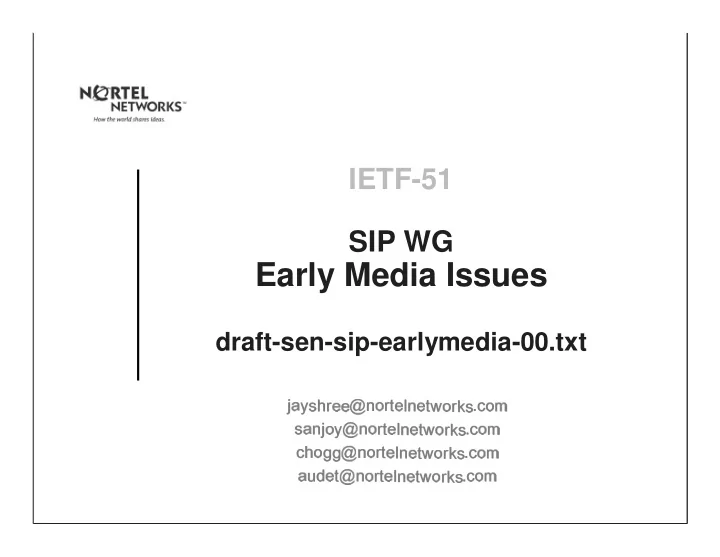

IETF-51 SIP WG Early Media Issues draft-sen-sip-earlymedia-00.txt MD H# V � MD\ \VKU VKUH HH # QRUW QRUWH HOQHW OQHWZ ZRU �F FRP RP RUN NV VDQ VDQM MR\ R\# # QR QRU NV � �FRP FRP UWH WHO OQHWZR QHWZRU UNV FKRJ FKR JJ J# # QRUW QRUWH V � �F FRP HOQ OQH HWZRU WZRUN RP NV DXGHW DXGHW# # Q QRUWH RUWHO OQHWZR QHWZRU UN NV V �FRP �FRP
Overview • Early media is the concept of delivering a media stream prior to call answer or session establishment – In terms of SIP this means media prior to “200 OK” being sent in response to an “INVITE” message. • There are two distinct reasons why Early Media is required when inter- working with the PSTN – Delivers inband call progress messages when inter-working with PSTN, such as: Treatments such as busy tone or reorder tone • Announcements (e.g. “This number has been changed to…”) • Ringing tone provided at far end when no subscriber free indication is • available in PSTN signalling (e.g. when call terminates on a PBX) – Avoids clipping of the backwards voice path when a call is answered This can happen because the audio media may unintentionally arrive at the • originating user agent ahead of the “200 OK” response to an “INVITE”. 1 August 6 th , 2001 draft-sen-sip-earlymedia-00.txt
Assumptions • Assumes unidirectional early media flow from callee to caller • Assumes use of extensions defined in draft-ietf-manyfolks-resources- 01.txt • Interworking scenarios are equally applicable to PSTN and PBX networks • Uses 2543-bis-03 and focuses on the issues due to limitations of SIP and related to interworking with the PSTN/PBX networks. 2 August 6 th , 2001 draft-sen-sip-earlymedia-00.txt
General Issues • The SDP-c received in 18x may Caller-A Caller-B contain a different session description INVITE (sdp-a) for early media than that contained in 183 (sdp-b) 200 OK for the actual media (SDP-d) PRACK [e.g., when the Early Media source is an announcement server] 200 OK (PRACK) • Resource reservation must re-occur if Resource Reservation the SDP-b in 183 differs from SDP-c in COMET 200 OK (COMET) 18x or SDP-d in 200 OK 18x (sdp-c) • Potential security loopholes since the PRACK firewall/NAT has to establish 200 OK (PRACK) pinholes/bindings without complete Early Media knowledge of the early media source 200 OK (sdp-d) address/port • Misuse of SDP in 18x (SDP-c) to indicate whether early media is expected 3 August 6 th , 2001 draft-sen-sip-earlymedia-00.txt
Scenarios PSTN Caller-A Gateway Network • PSTN Terminating INVITE (sdp-a) – The Gateway controller is unable Resource Reservation to determine an indication of early IAM media from received ACM. ACM 18x (sdp-b ?) Early Media ANM 200 OK (sdp-c) PSTN • PSTN Originating Caller-A Gateway Network – An ACM should be sent out to the IAM PSTN after reserving gateway Resource Reservation resource and prior to sending ACM INVITE (sdp-a) INVITE to the Caller-A (i.e., without receiving any call status information 18x (sdp-b) from Caller-A) to avoid Early Media Early Media clipping 200 OK (sdp-c) ANM 4 August 6 th , 2001 draft-sen-sip-earlymedia-00.txt
Forking Issues • Parallel Forking – Decoupling of SIP session control and the media can lead to potential race conditions between PSTN multiple Early Media sessions GW E T leading to undesirable user I V N I behavior during call set-up 183 INVITE Forking – Similar consideration applies to INVITE I PSTN N Proxy V multiple 18x’s I GW T E Forking INVITE Proxy • Sequential Forking – There may be need for sequential SIP 183 Endpoint play-out of multiple Early Media sessions (e.g., multiple announcements) Require a mechanism to trigger • branch migration at the end of each early media session 5 August 6 th , 2001 draft-sen-sip-earlymedia-00.txt
Proposed Strategies • Non forking – Make sure that resource reservation preconditions are met before Early Media exchange – In case, the SDP information changes in subsequent 18x or 200OK, the resource reservation must re-occur • Forking – Parallel Forking • Intelligent arbitration handling at Client terminal or at the gateway on the media path • Adding an indication (may be through a new header) in 18x response at the proxies to indicate to the client that the original INVITE has been forked – Sequential Forking • Prioritize forked requests or responses. This priority may be set by the end-user or can be communicated to the proxy prior to session establishment 6 August 6 th , 2001 draft-sen-sip-earlymedia-00.txt
Conclusion • No clear solutions for the issues with SDP within provisional messages and the forking problems • Forking problem needs improved signaling between the UA and the proxy • Giving the end user the choice of dealing with multiple received early media sessions may be the solution. Of course, this requires that the user be reconditioned from their current expectations of the behavior of the traditional PSTN/PBX calls 7 August 6 th , 2001 draft-sen-sip-earlymedia-00.txt
Comparison w/ draft-rosenberg-sip-early-media – There is an overlap with issues defined by the early media draft (draft-sen-earlymedia-00.txt) but the solution space is very different – It does not consider resource reservation phase – Assumes relaxation of restriction imposed by 2543RFC for supporting re-INVITE apriori of receipt of 200ok – Issues with SDP considerations in INVITEs, provisional responses and PRACKs are not resolved – PSTN inter-working scenarios may need closer study since early media negotiation (using183-PRACK exchange) is assumed to be done after ACM and this may lead to Early Media clipping problem. 8 August 6 th , 2001 draft-sen-sip-earlymedia-00.txt
Recommend
More recommend